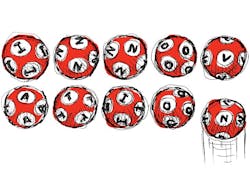Chance encounters in workplace design: The winning ticket to the innovation lottery?
Every organization seeks innovation in order to differentiate its products and services. But how do you engender more innovation?
One secret to more innovation, at least according to popular press articles and a number of blog musings, is "chance encounters." Chance encounters are those occasions when people who have no scripted reason to be with one another--they may not even know one another--nevertheless find themselves together and end up serendipitously co-creating the Next Big Thing.
Chance encounters get frequently referenced in articles about fostering innovation. One example often noted is Steve Jobs’ insistence of centralizing workplace cafés and toilets at Apple’s headquarters to ensure employees from various departments would collide as they headed to lunch and the loo. In addition to visionary opinions there are some well publicized innovations stemming from chance encounters.
And so it comes as no surprise that business leaders, consultants, and designers are trying to foster more random run-ins in the workplace. Logic dictates that if one chance encounter leads to one innovation then surely a steady stream of chance encounters will lead to a multitude of innovations.
Or will it?
The logic behind the push to cultivate chance encounters supposes that innovation is akin to a lottery. If once chance encounter yields a one in a million chance of innovating, then a second such encounter doubles your chances to two in a million. Doubled, yes. But still terrible odds. If you took the lottery logic to its extreme, you can imagine a company bringing otherwise segregated employees together for 10-minute one-on-ones like innovation speed dating. The goal would be to create thousands of chance encounters and hope that lightning strikes. And it might. But would you really bet on that type of process yielding innovation?
Undoubtedly, many chance encounters have resulted in innovations. And when they have, they are eternally fascinating, just like those lucky souls who win Powerball. But why is it that when telling these types of innovation stories we are so focused on the role that chance played? Presumably there were many variables that led to an innovation, such as the experience of the team involved, and chance was just one factor. If not, then we really are dealing with a lottery-style dynamic and any other combination of people would have had an equal chance at the same innovation.
But when it comes to innovating, it’s hard to imagine a series of chance encounters reliably and consistently yielding anything of substance. Just because some innovations stemmed from chance encounters doesn't mean that creating more chance encounters results in more innovations. Just like buying two lottery tickets instead of one isn’t really an improved wealth strategy. Clear-eyed thinking helps us realize that trying to innovate by creating more chance encounters is like trying to schedule spontaneity. It’s contradictory.
To be clear, there is nothing inherently bad about encouraging unplanned meetings between people who would not normally interact during the course of work day. Such encounters are reliably good for forging new relationships, rekindling dormant ones, and sustaining social networks. And beyond exchanging pleasantries, they may even lead to the occasional plan to meet up again (OMG, not by chance?!) to create something.
But, beware grand efforts to promote chance encounters as a primary means to innovation. If for no other reason than every encounter costs time, an inherently limited resource in our increasingly busy world. In a system of limited resources promoting proportionally more of one thing means we must be doing relatively less of something else. What else might more chance encounters keep you and your colleagues from accomplishing?
We must acknowledge explicitly what we know intuitively: that chance encounters more frequently lead to outcomes other than innovation. They're not necessarily bad outcomes, they're just not innovations. So certainly don't try to limit random run-ins. But given the finite nature of our time, the likelihood is that other sources will more reliably yield innovations.
Luck and good fortune in all of its forms (including chance encounters) will always have a featured seat at the innovation table. But unplanned meetings are characterized as "chance" for a reason. They can happen anywhere and at any time. And they do. But it’s time to recognize an unspoken truth: chance encounters should make for an optional ingredient, as opposed to the entire the recipe, for innovation.
So if innovation is your goal, what is one to do? I'll put my chips down any day on design thinking over chance encounters as the wellspring of innovation. In other words, a deliberately creative, planned process versus random run-ins. Chance will always plays a real role, but be careful not to think it’s the winning ticket to the innovation lottery.
About the Author: Marc Bruffett is a Principal in Gensler’s New York City office and a regional leader for Gensler’s Consulting practice area--a design strategy, workplace, and innovation consultancy. He specializes in alternative workplace strategy, workplace experience design, change management, portfolio strategy, and applied design thinking. Contact him at [email protected].
About the Author
Gensler
A global design firm with more than 5,000 practitioners networked across five continents, Gensler features insights and opinions of architects and designers on how design innovation makes cities more livable, work smarter, and leisure more engaging. Our contributors write about projects of every scale, from refreshing a retailer’s brand to planning a new urban district, all the while explaining how great design can optimize business performance and human potential. For more thought leadership and blog content, visit our Research & Insight page. Follow us on Facebook, LinkedIn, and Twitter.
